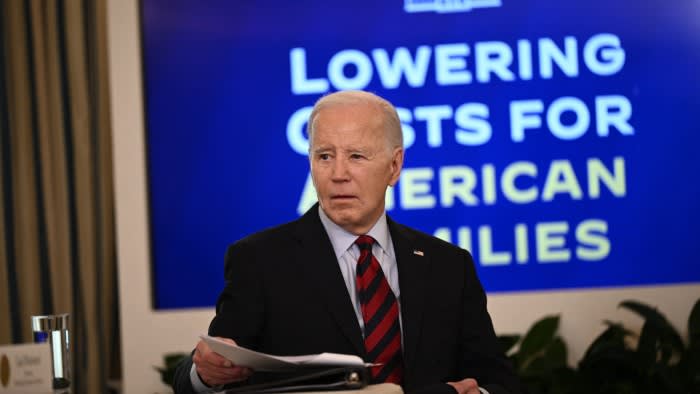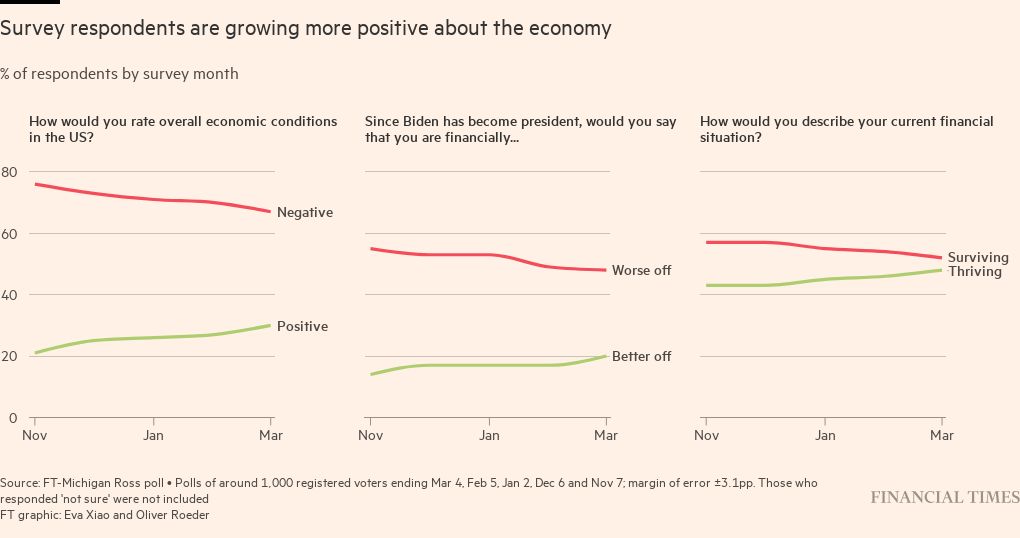Stay informed with free updates
Simply sign up to the US economy myFT Digest — delivered directly to your inbox.
Americans are increasingly happy about the economy but reluctant to give credit to Joe Biden, according to a new poll that underscores the US president’s challenges as he squares off against Donald Trump in this year’s general election.
Almost half of US voters said they were now living “comfortably” or able to “meet expenses with a little left over”, according to the latest FT-Michigan Ross poll. The 48 per cent figure recorded in March compared with just 43 per cent in November 2023, when the Financial Times first asked the question.
Similarly, 30 per cent of respondents described overall economic conditions in the US as “excellent” or “good” in March, up from 21 per cent in November.
By contrast, Biden’s approval rating on his handling of the economy in March remained flat from November, at just 36 per cent, while 59 per cent disapproved — down by just two points in four months.
“It’s bad news for President Biden because more voters rate him negatively on the economy than rate him positively,” said Erik Gordon, a professor at the Ross School of Business at the University of Michigan. “It has to worry his campaign that the independent voters who might decide the election rate his performance even worse.”
The grim polling news comes just as the president launches his run for re-election with a campaign based in part on the economic boom in the US during his term in office.
US growth last year was the strongest of any large advanced economy, while inflation fell faster. Unemployment remains near record lows and the economy added another 275,000 jobs last month, beating Wall Street forecasts. The S&P 500 has hit record highs this year.
“I inherited an economy that was on the brink. Now our economy is the envy of the world,” Biden said in his State of the Union speech on Thursday. The president also touted a capital investment bonanza across the country spurred by legislation such as the Inflation Reduction Act.
But Biden’s boasting still seems to be falling on deaf ears, despite almost 60 per cent of respondents to the FT survey saying that the economic issues like jobs and the cost of living would be most important in deciding their vote for president.
“Neither Mr Biden’s messaging nor the data has swayed many voters his way,” Gordon said.
The FT-Michigan Ross poll found that inflation remained the biggest source of stress for 80 per cent of voters, down only marginally from 82 per cent in November.
A possible bright spot for Biden was that poll respondents were most likely to blame “large corporations taking advantage of inflation” for price increases over the past six months, followed by the “lasting impact of Covid-19”.
Biden has increasingly sought to blame corporations for high prices, and made a populist crackdown on “junk fees” part of his speech to Congress on Thursday. His administration has also accused companies of exploiting customers through “shrinkflation” — charging the same price for smaller goods or fewer services.
The FT-Michigan Ross poll, conducted just before Trump in effect clinched the Republican party’s nomination for president on Super Tuesday, also laid bare Biden’s failure to match his 2024 rival in surveys.
Trump maintained a meaningful edge with voters on the economy, the poll showed, with 40 per cent saying they trusted his handling compared to 34 per cent for Biden. One in five said they trusted neither. Of self-described independents, just 16 per cent said they trusted Biden more than Trump on the economy, while 29 per cent chose Trump.
The views of independents pose a problem for Biden, who needs to persuade swing voters in critical battleground states to vote for him again to win re-election. On Friday, his campaign announced that it was launching a huge new advertising blitz across swing states.
The FT-Michigan Ross poll was conducted online by Democratic strategists Global Strategy Group and Republican polling firm North Star Opinion Research between February 29 and March 4. It reflects the opinions of 1,010 registered voters nationwide, and has a margin of error of plus or minus 3.1 percentage points.
Additional reporting by Oliver Roeder in New York and Eva Xiao in Baltimore


